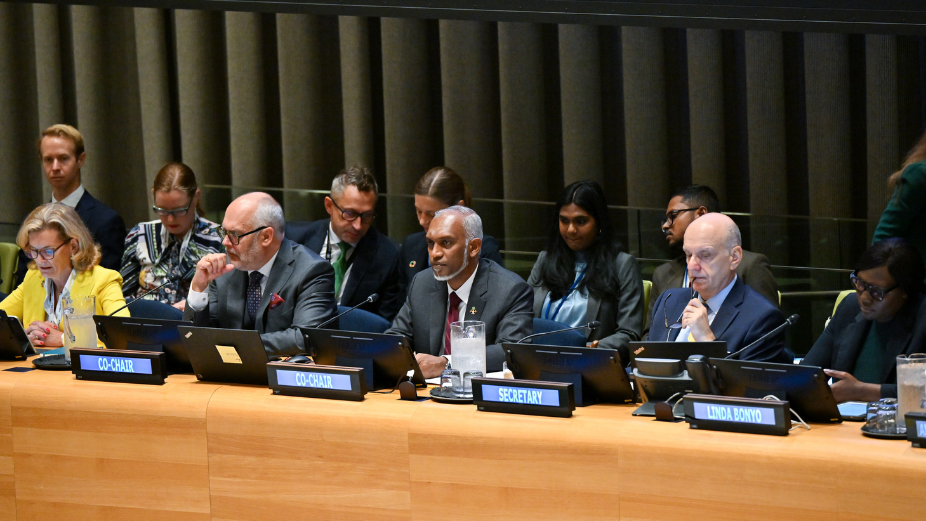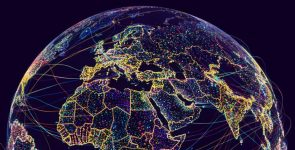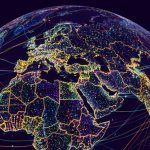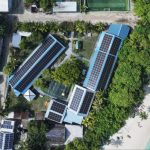
In an address at the Summit of the Future’s Interactive Dialogue 3, President Dr Mohamed Muizzu, emphasised the urgent need to bridge the global digital divide. The session, themed “Towards a Common Digital Future: Strengthening Inclusive Innovation and Cooperation to Bridge the Digital Divides,” took place on 23 September 2024, highlighting the critical role of digital inclusion in fostering sustainable development.
Opening his remarks with a powerful invocation, President Muizzu highlighted the rapid advancements in Artificial Intelligence (AI), noting, “The Future is Intelligence Driven”. He acknowledged that AI’s swift progression has outpaced even expert comprehension, posing both opportunities and challenges on a global scale.
A striking statistic set the tone for his speech: over one-third of the world’s population remains disconnected from the internet, with developing countries bearing the brunt of this digital exclusion. “This digital divide is not only about access to the internet. It is a profound barrier to development, opportunity, and justice,” he stated. For Small Island Developing States (SIDS), Least Developed Countries (LDCs), and Landlocked Developing Countries (LLDCs), the digital gap exacerbates existing vulnerabilities, hindering progress towards economic and social resilience.
President Muizzu called upon all participants to align their efforts with the objectives of the Global Digital Compact, advocating for policies and actions that ensure inclusivity. He outlined three key strategies to bridge the digital divide:
1. Empowering Youth in the Digital Economy
The President stressed the importance of equipping young people with the necessary skills to thrive in the digital landscape. “In the Maldives, we are committed to investing in digital skilling and re-skilling to fuel local innovation and drive economic diversification,” he explained. Additionally, he highlighted initiatives to support micro, small, and medium enterprises (MSMEs) and freelance workers, enabling them to access global markets and contribute to the digital economy. This focus aims to position youth as leaders in driving digital transformation.
2. Building Robust Digital Infrastructure
Acknowledging that digital technologies are essential for achieving the 2030 Agenda for Sustainable Development, President Muizzu emphasised the need for comprehensive digital infrastructure. “We can achieve the SDGs by adopting best practices from both developing and developed countries,” he asserted. Key investments include expanding high-speed internet coverage, enhancing digital access to essential services, and integrating AI to boost productive capacity. The Maldives’ National Centre for Information Technology is at the forefront of these efforts, undertaking initiatives that promote technology transfer, capacity building, and increased investment.
3. Safeguarding Consumer Rights in a Digitalised World
As digitalisation progresses, protecting consumer rights becomes paramount. The President addressed concerns related to unauthorized access, account hijacking, and data privacy. “To address challenges in the Maldives, we’ve established the National Cybersecurity Agency to tackle security concerns that arise in digitalisation,” he stated. He called for robust resources to build resilient cybersecurity infrastructure and underscored the necessity of international cooperation, investment, and genuine partnerships to support these endeavours.
President Muizzu concluded his address by reaffirming the Maldives’ commitment to fostering an inclusive, resilient, and just digital world. “Together we can harness the digital revolution towards our common future,” he affirmed, expressing eagerness to hear from other nations about their experiences, best practices, and challenges in the dialogue.
The President’s remarks at the Summit of the Future highlight the Maldives’ proactive stance in addressing the digital divide, advocating for collaborative efforts to ensure that no country or individual is left behind in the rapidly evolving digital age.









